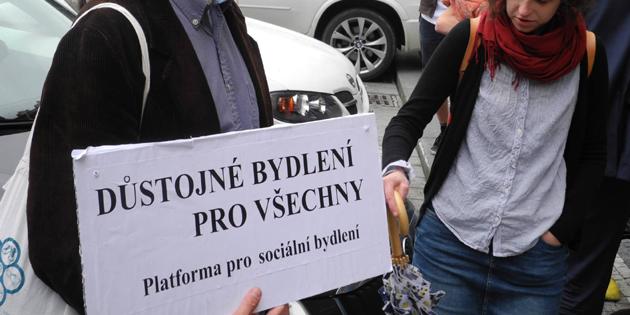Czech NGOs say social housing can be addressed through more investment

The Czech state should invest more money into social welfare, including social housing, or it will not be possible for towns and villages to be responsible for providing it. That is the joint statement released recently by the Platform for Social Housing and the Union of Towns and Municipalities of the Czech Republic (Svaz měst a obcí ČR – SMOČ).
The NGOs say residential hotels are not a solution to social housing, but that the provision of standard rental housing and support services is the way to go. People in difficult living situations must also be helped through the creation of sufficient employment opportunities.
Municipalities play a fundamental role in social housing. However, they cannot replace the role of the state, which has not yet designed a comprehensive solution for social housing, although it has planned a Concept for Housing in the Czech Republic until 2020, which has been adopted by previous governments.
The Concept promised significantly higher support for rental housing, but that has not yet happened. "Social housing must be addressed systemically," says Jana Vildumetzová, Executive Director of SMOČ, adding: "The discussion of what form social housing should take must happen through a partnership between the state, towns and municipalities, and nonprofit organizations. The state must ensure sufficient financing for the system. Together with the Platform for Social Housing, we see the way forward as lying in increased support for standard rental housing, not in support for residential hotels. A prerequisite for the long-term sustainability of housing is, of course, income, which is why it is absolutely essential that there be enough jobs available as well."
The Platform and SMOČ believe that the Czech Republic’s very controversial residential hotels have no place in any long-term solution to the situations of families with children in need or in social housing policy in general. Jan Milota of the IQ Roma servis NGO, who is a coordinator of the Platform, explains why: "Social housing is supposed to be a tool for social inclusion. That means it can only be provided through regular rental housing. Residential social services do exist, per the law on social services, to address crises. The organizations associated in the Platform currently operate more than 170 social housing units, but this is far from enough. The state should learn from our experiences."
The Platform and SMOČ propose that the aim of social housing be clearly identified and that the costs associated with it be calculated. Given the existing limits and the planning process for the state budget, it is necessary to evaluate this increase of expenditures on social welfare, including social housing, over the long term.
Petr Pospíšil, chair of the Social Inclusion Working Group at SMOČ, stresses that "State expenditures on social welfare, including state support for social housing, are completely insufficient today. There is no point in drafting yet another concept without a clear budget, for the medium term at least, in which the state’s financial obligations in this area are significantly increased."
According to recently published data, there are as many as 11 million unoccupied apartment units available throughout Europe. Today, many rental social apartments in the Czech Republic are being administered by nonprofits in cooperation with municipalities.
Together, local governments and NGOs are helping to address homelessness and helping people escape the debt trap. Both municipalities and nonprofits could contribute their ideas and their practical experiences to the design of a Czech social housing concept and related legislation such that the new laws adopted would respond to the actual needs of people in difficult living situations.